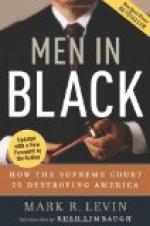The twelve men being in the box the counsellors begin to examine them as to their qualifications. On a small board bound lengthwise by rubber bands, or stuck in grooves are the cards drawn from the wheel and arranged according to the number of the seats, and containing the names, addresses, and occupations of the gentlemen seated in the box. There are two means of removing a juryman. One is by challenge for cause, i.e., that he is shown to be unfit or prejudiced, and the other is what is known as a peremptory challenge which is practically the same as saying one side or the other does not like the man’s looks. There are connotations about the word challenge which are essentially dramatic. It implies a battle, a duel, a tournament.
It is difficult to ascertain exactly what principles govern the successful examination and selection of a jury. In Massachusetts and in certain important cases in New York, the whole panel of jurors summoned for the term of court have been investigated by detectives in order that the lawyer might have information about who was to be rejected or accepted as a juror to decide the case. The propriety of doing this may be questioned and the ordinary case could not bear such an expense.
Nevertheless there is a possibly sound reason for obtaining such information. Given a man’s condition in life, his habits, his occupation, his church, his associations, his politics, and given on the other hand a certain state of facts, it is nearly ascertainable how he is going to decide those facts. If a man has always been a rent payer and has probably had continued trouble with his landlord about repairs and a feeling of resentment at the regular recurrence of rent day, is it not natural that he is going to be somewhat prejudiced against a landlord in a dispute between landlord and tenant? or on the other hand can a man who is one of the unfortunate owners of real estate, and who having paid taxes, interest, insurance, repairs for removal of tenement house violations, and with frequent vacancies, really be absolutely just? If a juryman is a Jew, a Catholic, or a Baptist, there will probably be an innate sympathy for his co-religionist. The law does not recognize this unless the juryman is honest enough to confess a prejudice. The soundness of the Anglo-Saxon jury system is based on the theory that there is not one juryman but that there are twelve and that among twelve there will be an average between the landlord and the rent payer, between the Baptist and the Catholic.
The counsel ordinarily selects the jury with observation and common sense as his sole guide. The customary question asked jurymen, whether, given such and such a state of facts, “Do you think you could render a fair and impartial verdict?” is manifestly absurd to the juryman. Every man believes himself to be perfectly honest and just. It takes a strong character to say, “I couldn’t be fair.” As a matter of fact such a man ought to be kept on the jury rather than let go. As a juryman once said to a lawyer after the case: “Why did you excuse me when I said I knew the other lawyer? You wasted your challenge; he wouldn’t have let me stay. I knew him too well.”




